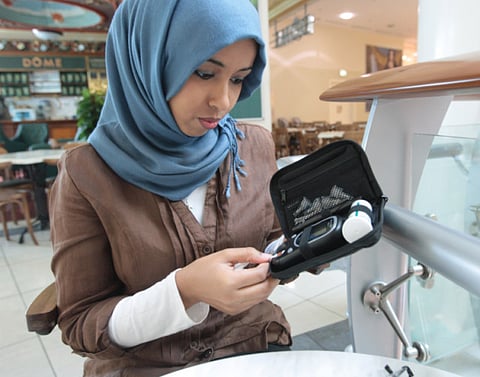Type 1 diabetic attempts fasting this Ramadan after a gap of three years
Challenge is to drink enough water to keep hydrated, she says

Abu Dhabi: In the hot days of summer, individuals must plan their meals carefully in order to avoid dehydration and to maintain energy levels during the day. For Huda H., the challenge is even greater; she is a Type 1 diabetic who is attempting to fast this Ramadan.
“I know that I am excused from fasting because of the negative effects it can have upon my body. But iftar truly lends Ramadan its special flavour, and I want to experience it after abstaining from food and water during the day,” the 26-year-old cognitive trainer from Somalia told Gulf News.
“So, after not trying to fast at all over the last three years, I am giving it a shot once again. And I have managed to complete all the fasts till date,” she added.
Fasting in Ramadan is a pillar of Islam that is obligatory for all sane Muslim adults in good health. It is however not mandatory for individuals who may fall sick, and this can include diabetics whose blood sugar levels are at risk of crossing the recommended limits. Type 1 diabetics tend to be especially at risk, because their bodies do not produce sufficient insulin, thus creating the need for regular insulin shots and scheduled meals to maintain the level.
Huda was first diagnosed with the auto-immune condition (a disease caused by inappropriate immune responses of the body against substances and tissues normally present in the body) at the age of 12 , and is the only one in her family with it. She needs to take about four insulin shots every day, and must adhere to meal times and healthy portion sizes at all times.
“My blood sugar level can drop too low in the absence of regular meals, or it can spike due to dehydration, among other reasons. When I tried fasting about three years ago, I found that my levels dropped very low, and I would suffer from cold sweats, shaking hands, dizziness and weakness. Because of the risks, I then had to break my fast in the middle of the day, and only managed about seven fasts that Ramadan,” Huda said.
She also explained that low blood sugar creates an urgent need to break one’s fast. However, in cases when blood sugar levels rise, a fasting diabetic must exercise judgement to decide whether or not to continue with the fast.
“A lot of people continue fasting, but if this continues to occur during the whole month, it creates a sustained period of high blood sugar and can be detrimental for the body in the long run. I therefore believe it is unhealthy for me to do this,” Huda said.
She was however able to fast as a young child without any difficulty, and even managed to fast in the first year of being diagnosed.
“It became risky afterwards and, as we are not urged to risk our health, I stopped. But what sets Ramadan apart is the joy of sharing iftar, and the nightly Taraweeh prayers. I understand the risks of fasting and do not want to exert myself, but I also want to attempt fasting,” Huda added.
After a regular medical check this summer, her endocrinologist began offering advice for healthy fasting.
“It struck me then that I might be able to manage it after all. And even though this is one of the most difficult years to fast because of the summer heat, I have been successful so far with the grace of Allah,” she said.
There are still challenges that Huda must overcome. One of these includes scheduling her insulin shots. Another is to drink enough water in the evening to keep herself hydrated during the day.
“I find that there is very little time to drink enough water between iftar and suhour. But not having enough could leave me dehydrated. So I am trying to fit in enough fluids, and cut out on diuretics like tea and coffee,” she said.
“Other than that, I am enjoying ending my fast with the rest of my family members at iftar time, and am opting for healthy meals devoid of fried and fatty foods. I hope I can continue in the same way till the end of the month,” Huda added.
Sign up for the Daily Briefing
Get the latest news and updates straight to your inbox


